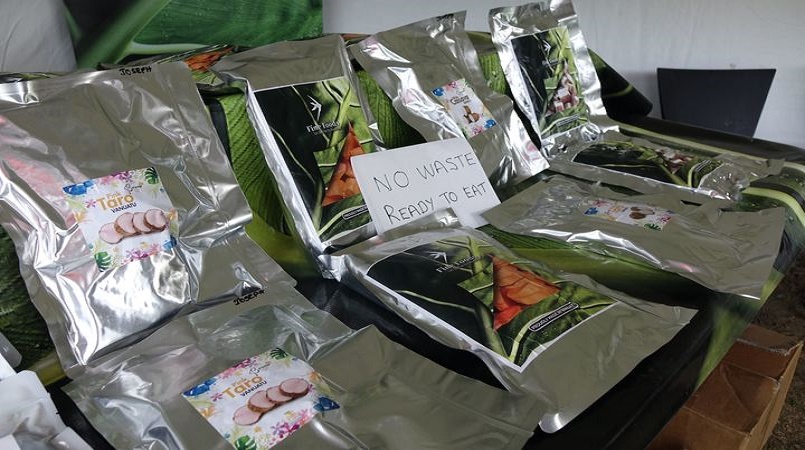
When Cornelia Wyllie of Fine Foods Limited in Vanuatu, developed meal packs of taro and beef or pork a few years ago the aim was providing healthful tasty meals for ni-Vanuatu workers on the Recognised Seasonal Employer (RSE) Scheme in New Zealand.
But today the meal pack could reach a wider customer base and even be used as an option for food security during rapid relief operations following natural disasters.
Fine Foods offers pre-cooked diced taro and kumara packs and heat and eat meal packs in pouches. The meal packs contain two individual parcels of either grated or mashed taro, banana or kumara mixed with coconut cream encasing minced beef, pork or left plain and wrapped in a banana leaf – similar to tamales of Central and South America. The pouches can be heated through in 10-15 minutes and the contents are ready to eat.
Mrs Wyllie was part of the Pacific Trade Invest (PT&I) NZ Pacific Path to Market delegation to Pasifika Festival in Auckland recently. A group of 25 small business representatives from eight Pacific Islands were part of the Pacific Path to Market programme to better understand the New Zealand market and spark interest in potential buyers.
Mrs Wyllie noted the biggest demand at Pasifika was mostly from European and Asian buyers, campers and travellers who were interested in heat and eat type meals or those looking for something new. At Fine Food Australia in Melbourne, leads came from China for the F Juice (Feijoa) and New Zealand for the Spicy’kai sauces. Interest came from the Italian, Greek, European and Chinese buyers who were interested in bulk buying for the food service trade.
The first New Zealand shipment in 2015 of Fine Foods products was to the RSE workers in Hastings and the Bay of Plenty. The non-meat version is known locally as simboro while the meat version is called Tuluk. The response from the ni-Vanuatu workers was bigger demand. The company now exports over 70 tonnes of mixed products to New Zealand since new equipment was installed. The exports of Natur’kai to Brisbane and New Zealand are still comparatively minor compared the company’s other main exports. However branding the products Natur’Kai or Natural Food means they can position themselves for future marketing into Europe.
Current demand in New Zealand comes from three main areas – importers Vine Power, owners of Tanna Farms who are contracted to grow taro for Fine Foods. When the RSE workers return to Vanuatu, they grow the taro which is then supplied to Fine Foods. On returning to New Zealand, they bought the finished product from Fine Foods. “It’s full loop,” Mrs Wyllie said.
The second group comprises two Recognised Seasonal Employers (RSE) agents who will slot the foods into their RSE induction programmes. Mrs Wyllie is currently in the process of contacting the New Zealand employers. The third group is part of the National Disaster Management Office.
Prior to Tropical Cyclone Pam’s trail of destruction across Vanuatu in 2015, Dr Chris Bartlett of the National Disaster Management Office had visited the Fine Foods factory. Dr Bartlett was the leader of the Rapid Response Team and tried to order their entire stock. But they didn’t have the equipment installed and couldn’t supply more.
Since then, Fine Foods has purchased new equipment and upped the level on packaging. Because the packs could potentially be used as food packs during natural disasters, they hired a food technologist to create packs to military standard thickness of aluminised pouches. For everyday use, however, regular export packs are sufficient with an 18-month shelf life. A visual panel will be added and the packs will be microwaveable in future. Mrs Wyllie sister Petra is a school teacher in an Auckland school, whose students and staff will participate in evaluating the product.
Vanuatu’s attendance on the Pacific Path to Market delegation to Pasifika Festival this year is a sign that despite the devastation caused by Cyclone Pam, the islands are continuing the uphill battle to get back to their pre-Cyclone Pam days.
Mrs Wyllie said the Vanuatu agriculture sector will take a few more years to recover. Long term crops such as coffee, cocoa will take another year as they needed to be pruned heavily to reshape after CT PAM.
Short term cash crops such as manioc, taro, kumara are so important to the recovery phase as the sales give a little cash flow whilst forestry and long term crops (kava) recover. Forestry and coconut are looking at setting up more nurseries for replanting. Vanuatu’s growing tourism industry is looking forward to the airport upgrade.
